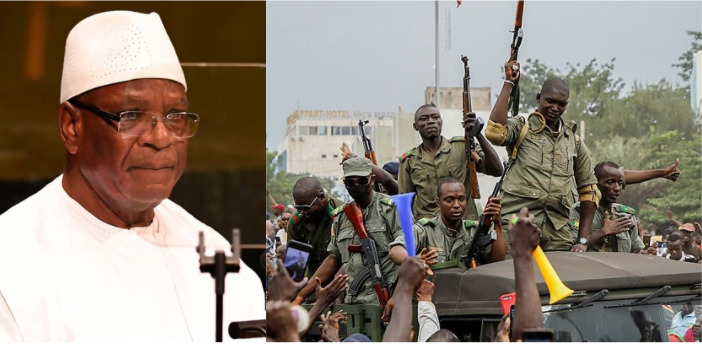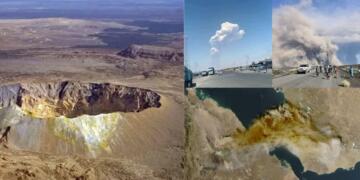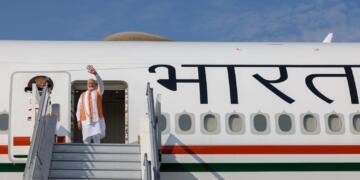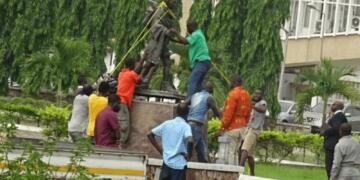Malian President, Ibrahim Boubacar Keita announced his resignation on Tuesday after a military mutiny in the capital city of Bamako. He was led by soldiers holding a gun to his head. The former President, now under military detention at a base in Kati announced his resignation saying that he does not wish for any bloodshed in the country and that he doesn’t have any choice. The current ousting of a civilian government by the military comes as the fourth coup ever since the country gained independence in 1960.
Keita’s government has been criticised for its mishandling of Islamic insurgency in the country, particularly in the Northern region. The seeming military coup came after a week-long political crisis, with protestors demanding his departure due to his inability to handle a crumbling economy and worsening security situation. President Ibrahim Boubacar Keita did not take any harsh steps to counter the Islamists of his country who aim at installing an absolute and unquestionable Islamic rule in Mali, one which religiously follows the doctrines of sharia.
Mali is a Muslim-majority country, with over 95 per cent of the total population calling themselves adherents and practitioners of Islam. What is interesting, however, is the fact that a vast majority of Malians find no audience in the extremist shenanigans of the Arabs, which the world largely knows as Wahabism or Salafism. Therefore, the military junta ousting a government which failed at keeping extremism and terrorism in check finds massive popular support among a majority of Mali’s population. The armed terror groups are majorly concentrated in Northern Mali, which is closer to the Islamic-dominated Saharan region, as opposed to the rather secular and tolerant nature of people residing in other sub-tropical parts of the country.
Much of Mali’s troubles can be attributed to its precarious geographical location, which is in the Sahel region of the African continent. The Sahel region lies at a transitional zone, with the Sahara Desert in the north and the tropical rain-forests in the south. Hence, with a semi-arid topography, the Sahel climate is extremely unpredictable, with dry and hot weather conditions further marred by a history of frequent droughts. The Sahel region of Africa includes Senegal, Mauritania, Mali, Burkina Faso, Algeria, Niger, Nigeria, Cameroon and the Central African Republic, Chad, Sudan, South Sudan, Eritrea and Ethiopia. These countries, which lie in this region often, find themselves in the global spotlight for all the wrong reasons. Famines, religious terrorism, overpopulation, diseases, social unrest and anti-state rebellions have been major causes of misery for them all.
A population which is fighting all possible troubles which can descend upon them, at the very least wants a government which works toward alleviating prevailing miseries. Islamic terror is perhaps the biggest misery which Malians have to deal with, and the least which was expected of President Ibrahim Boubacar Keita was for him to exterminate such armed groups from the country, which he perhaps did not even try to do, leading to the current military intervention in the country.
Essentially, there exist five main Islamist terror groups in Mali, namely – Ansar Dine, Movement for Unity and Jihad in West Africa (Mujao), al-Qaeda in the Islamic Maghreb (AQIM), the Signed-in-Blood Battalion and the Islamic Movement for Azawad (IMA). There is also The National Movement for the Liberation of Azawad (MNLA), which is ethnically driven, fighting mostly for the rights of Mali’s minority Tuareg community.
The Sahel region is home to a rather dangerous confluence, that of Islam and Christianity. While missionaries are carrying out widespread operations in the entire continent and have been able to accelerate the growth of Christianity way over the proliferation of Islam, those bearing faith to radical and militarised Islam have increasingly, over the years, begun feeling insecure, as they fear their sphere of influence in Northern Africa also thinning in the foreseeable future. While Northern Africa is heavily Muslim consisting of 400 million Muslims, Southern Africa is more so Christian dominated with 500 million Christian adherents.
The objective of all Islamist armed groups in Mali is to force Islamic rule in the country, against the will of the people. Ansar Dine and the AQIM both resort to terror in anticipation of their jihad leading to the installation of Islamic law in the country. The AQIM aims to also ‘liberate Malians from French colonial legacy’. Meanwhile, the Mujao’s goals are not Mali-centric; instead, they act upon their aim of rather an international stature, which involves spreading jihad to West Africa.
The now-ousted President of Mali failed to deal with these Islamist groups with an iron hand. To his defence, however, it must be mentioned that the Malian ground army is not very much equipped to take on a multitude of jihad-waging Islamist groups, and the country, therefore, ends up relying on the UN peacekeeping forces, and the soldiers of other countries to maintain ‘peace’ in the country. Why such forces are not intervening during the ongoing military coup also raises eyebrows.
Meanwhile, The Economic Community of West African States (ECOWAS) has condemned the coup attempt in Mali and has moved to suspend the country from its decision-making body, while also threatening to impose sanctions if the crisis furthers. The United Nations Security Council also held an emergency meeting to deliberate upon the ongoing Malian crisis, even as the UN Secretary-General, Antonio Guterres condemned the arrest of Keita and members of his government, calling for their immediate release and an “immediate restoration of constitutional order and rule of law in Mali.” The European Union said in a statement that it “strongly condemns the coup attempt underway in Mali and rejects any unconstitutional changes.” Russian Deputy Foreign Minister Mikhail Bogdanov said that Russia has received information about the arrests of Mali’s president and prime minister, adding that Moscow is concerned regarding all that is unfolding in Mali.
The military coup in Mali, despite finding support among the local population, finds no international takers. Here on, what is in hold for the country is yet to be seen, and whether or not the Islamist groups will finally be taken to a task will be determined by all that which unfolds in Bamako, the Malian capital, which by the way, is located towards the country’s extreme south.




























